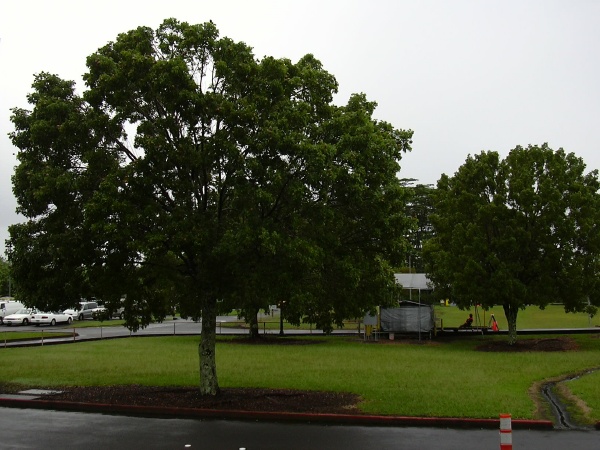
References
Primary Literature Sources
1. Howard, F W, S Nakahara, and D S Williams. “Thysanoptera as
apparent pollinators of West Indies
mahogany , Swietenia mahagoni (Meliaceae).” Annales des Sciences
Forestieres 52.3 (1995) :
283-286. Print.
2. Bauer GP. 1987. Swietenia macrophylla and Swietenia
macrophylla X S. mahagoni development and
growth: the nursery phase and the establishment phase in line
planting in the Caribbean National Forest, Puerto Rico. M.S.
Thesis. State University of New York, College of Environmental
Science and Forestry, Syracuse, N.Y.
3. Krisnawati, H., Kallio, M. and Kanninen, M. 2011 Swietenia
macrophylla King: ecology, silviculture and
productivity. CIFOR, Bogor, Indonesia.
4. Matsuse, I. T., Nakabayashi, T., Lim, Y. A., Hussein, G. M.
E., Miyashiro, H., Kakiuchi, N., Hattori, M.,
Stardjo, S. and Shimotohno, K. 1997. A human immunodeficiency
virus protease inhibitory substance from Swietenia mahagoni.
Phytotherapy Research, 11: 433–436.
5. McNair, Douglas,
Pierce,Judy J., and Sladen, Fred W.
"HISTORICAL AND CURRENT STATUS OF THE
CATTLE EGRET." The U.S. Virgin Islands Department of Planning
and Natural Resources. Division of Fish and
Wildlife. Web. 17 Oct. 2011.
http://fw.dpnr.gov.vi/wild/Docs/doug's bird articles/W15
Final-Cattle Egret.pdf .
6. Moh, Carl C.. 1976. Annual Report to the United States Atomic
Energy Commission Contract AT(30-1)-2043. P. 66. Turrialba, Costa Rica.
7. Rahman, A., A. Chowdhury, and H. Ali. "Antibacterial activity
of two limonoids from Swietenia
mahagoni against multiple-drug-resistant (MDR) bacterial
strains." Journal of Natural Medicines 63 (2008): 41-45.
Springer Link. 9 Sept. 2005. 13 Nov. 2011
http://www.springerlink.com/content/b3222n1q23r07561/
.
8. Rodan, Bruce D., Newton, Adrian C., and Verissimo, Adalberto.
1992. Mahogany Conservation: Status
and Policy Initiatives. Environmental Conservation, 19 , pp
331-338.
9. Speight, M. R. 2001. Discussion summary: Integrated pest management of Hypsipyla spp. p. 179. In loyd RB, Hauxwell C (eds.), International Workshop on Hypsipyla shoot borers in Meliaceae, 20-23 August 1996. ACIAR Proceedings No. 97.
10. Valera, Fernando. "GENETIC RESOURCES OF SWIETENIA AND
CEDRELA IN THE NEOTROPICS:
Proposals for Coordinated Action." FAO: FAO Home. Forestry
Department. 13 Nov. 2011
http://www.fao.org/DOCREP/006/AD111E/AD111E00.htm#ack
.
References
11.
Armstrong, W. P. "Entheology.org - Preserving Ancient
Knowledge." Entheogens | Salvia Forum |
Psychoactive Plants | Hallucinogens. 10 Nov. 2011
http://www.entheology.org/edoto/anmviewer.asp?a=151
.Ripley, George, and Charles A. Dana. "Mahogany (Swietenia
Mahagoni)." The American Cyclopedia. Vol.
7. D. Appleton And, 1873. Print
12.
Blake, John Lauris. "The family encyclopedia of useful ... -
John Lauris Blake." Google Books. 10 Nov.
2011
http://books.google.com/books?id=1lUMAAAAYAAJ.
13. Francis, John K. "West Indies Mahogany." US Forest Service. Sept. 1991. Web. 7 Nov. 2011.
http://www.fs.fed.us/global/iitf/pubs/sm_iitf046 (7).pdf. 14.
"Species Information." World Agroforestry Centre | TRANSFORMING
LIVES AND LANDSCAPES. Web. 07 Nov. 2011.
http://www.worldagroforestrycentre.org/sea/Products/AFDbases/AF/asp/SpeciesInfo.asp?SpID=1567
.
15.
Howard FW 1990. Population suppression of mahogany webworm,
Macalla thyrsisalis (Lepidoptera:
Pyralidae), with natural products. Florida Entomologist 73:
225-229
16.
Howard, F. W., and Merida, Michael A. "Mahogany Shoot Borer."
EDIS. Apr. 2010. Web. 15 Oct. 2011.
http://edis.ifas.ufl.edu/in613.
17.
"Mahogany: Genuine or Imposter? | Good Millwork." Good Millwork
Architectural Moldings, Exterior
Shutters, Wood Siding and Rare Woods. Web. 07 Nov. 2011.
http://www.goodmillwork.com/mahogany-genuine-or-imposter/
.
18.
Sydenham, S. & Thomas, R. Tropical Rainforests [Online]
www.kidcyber.com.au(2002).
19. Wunderlin, R. P., and B. F. Hansen. 2008. Atlas of Florida Vascular Plants (http://www.plantatlas.usf.edu/).[S. M. Landry and K. N. Campbell (application development), Florida Center for Community Design and Research.] Institute for Systematic Botany, University of South Florida, Tampa.